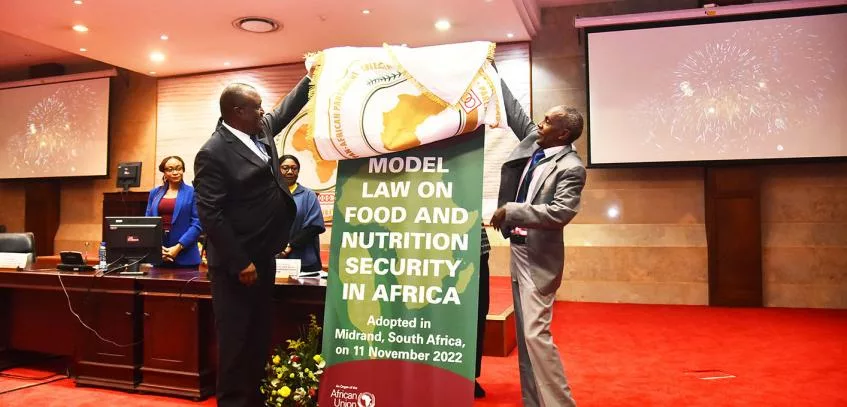|
Getting your Trinity Audio player ready...
|
African Parliamentarians must prioritize and intensify the fight against hunger to achieve the continent’s mission of Ending Hunger, said the Pan-African Parliament President, H.E. Chief Fortune Charumbira, while unveiling the “milestone” Model Law on Food and Nutrition Security in Africa in Midrand, South Africa.
Adopted by the Pan-African Parliament Plenary on November 11, 2022, the purpose of the model law is to guide or serve as a source of inspiration for African Union (AU) Member States aiming to develop national or sub-national legislation on the right to adequate food and food and nutrition security (FNS). AU Member States may use the model law to elaborate framework laws, primary legislation, or secondary legislation that covers all or some aspects of FNS.
“It is important that we start debating food security as a human right. We need to do better as an institution; ours should not be just a talk show. I implore all Parliamentarians to take the debate about food security as a human right to our various national Parliaments. It is high time we move towards defeating hunger; we cannot have our continent lagging behind forever in these issues.”
Reminding Parliamentarians that Article 17 of the Constitutive Act of the African Union (AU) establishes the Pan-African Parliament to ensure the “full participation of the African people in the development and integration of the continent,” H.E. Charumbira appealed to Africa to produce its food at the ongoing 3rd Ordinary Session of the 6th Parliament of the Pan-African Parliament.
“We have countries from other continents that are experiencing serious climate change challenges but are managing food challenges. In our continent, we have everything for our own sustainability when it comes to producing our own food, but we are failing. This business of relying on food from other continents must end; let us collectively come up with ideas that will assist us in defeating this hunger that remains a threat to us.
“I challenge our Agriculture Committee to put our ideas into action. Everything conceptualized from this launch must be utilized in our various national parliaments in lobbying for a hunger-free Africa. We will be seeking feedback reports from everyone relating to this urgent matter. Our continent must move a step further in putting forward better needs for Africans,” added H.E. Charumbira.
According to AUDA-NEPAD’s published report titled “Ending Hunger in Africa: The Elimination of Hunger and Food Insecurity on the African Continent by 2025 – Conditions for Success,” the AU has set a target to “eliminate hunger and food insecurity by 2025.” Both Agenda 2063 and the AU Summit decision on Accelerated Agricultural Growth and Transformation have reaffirmed this commitment (African Union, 2014, 2015). However, the report argues that Africa is not currently on track to meet these targets and underscores that immediate, mutually reinforcing interventions are required to bring the continent closer to eliminating hunger and food insecurity.
Addressing delegates, Hon. Didier Molisho Sadi, Chairperson of the Rural Economy, Agriculture, Natural Resources and Environment Committee, shared the history of the launched model law, disclosing that it is a collaboration of the Pan-African Parliament, the World Food Programme (WFP), and the Food and Agriculture Organisation (FAO), who in 2016 signed a Memorandum of Understanding on Food and Nutrition Security through the Pan African Climate Justice Alliance (PACJA).
FAO’s Assistant Director General, Dr. Abebe Haile-Gabriel, echoed the Chairperson’s sentiments, hailing the launch of this model law as the fruit of their unending commitment to ending hunger and malnutrition in Africa through a partnership that has framed efforts to advance parliamentary action against hunger and malnutrition through technical assistance, capacity development, awareness-raising, and policy dialogue.
According to FAO’s description, hunger, or undernourishment, is an inability to acquire enough food to satisfy dietary energy requirements. Food security is a situation where all people at all times have access to food and is composed of four dimensions: food availability, economic and physical access to food, food utilization, and stability over time. FAO also underlines that nearly one in five people living in Africa is hungry. That rate has decreased steadily since the mid-1990s, with the fastest decline in West Africa and the lowest undernourishment rate in Northern Africa. Unfortunately, the total number of undernourished Africans has climbed since 1991, largely driven by the increasing population. East Africa has the highest levels of hunger in terms of both prevalence and absolute numbers—about half of the total undernourished population of the continent is in its Eastern region.
Ms. Estherine Fotabong, Director for Agriculture, Food Security, Environmental Sustainability, and Climate Change, said this launch marks a pivotal step in “our collective efforts to ensure that every African has the right to adequate food that is safe and nutritious.”
“Food and nutrition security is more than just a goal—it is a fundamental human right and a cornerstone of sustainable development. The availability, accessibility, stability, and utilization of food are critical to ensuring the health and well-being of populations and fostering economic growth and stability across the continent,” she said.
Lydie Kouame, a Deputy Director of the WFP at the AU Global Office, said her organization, which is present in 46 African countries and has been active for 60 years, is renewing its commitment to end hunger and malnutrition. She added that food security and nutrition are not only a fundamental human right but are also a block of sustainable development. Access to food that is nutritious and safe is essential to the well-being of people, the prosperity of communities, and the general progress of nations.
SOURCE: PAN AFRICAN PARLIAMENT






